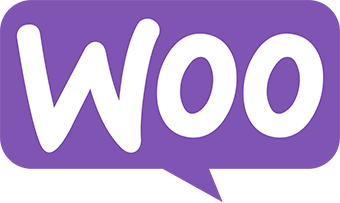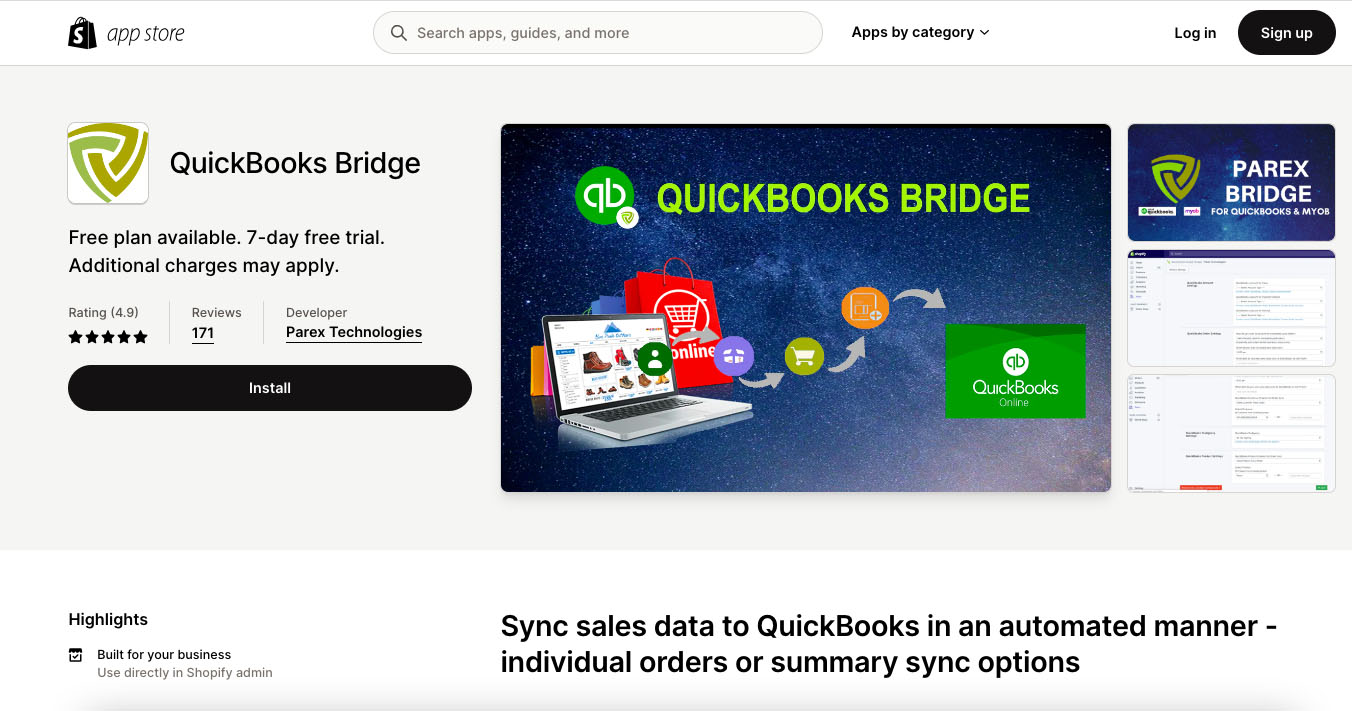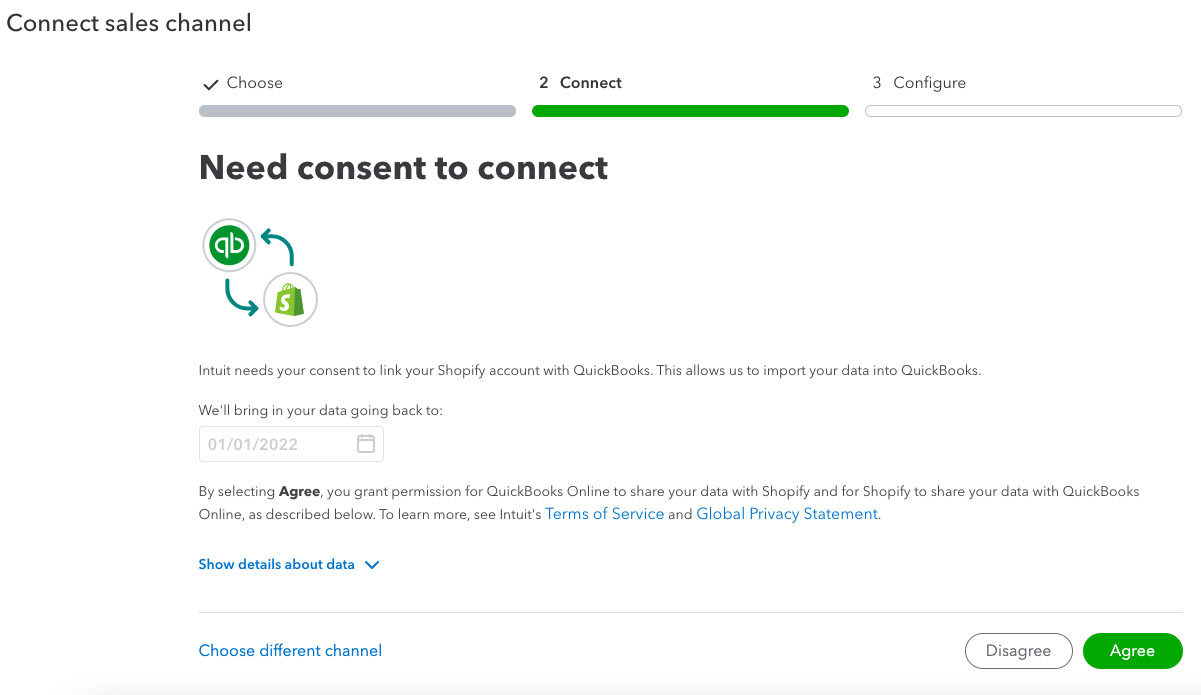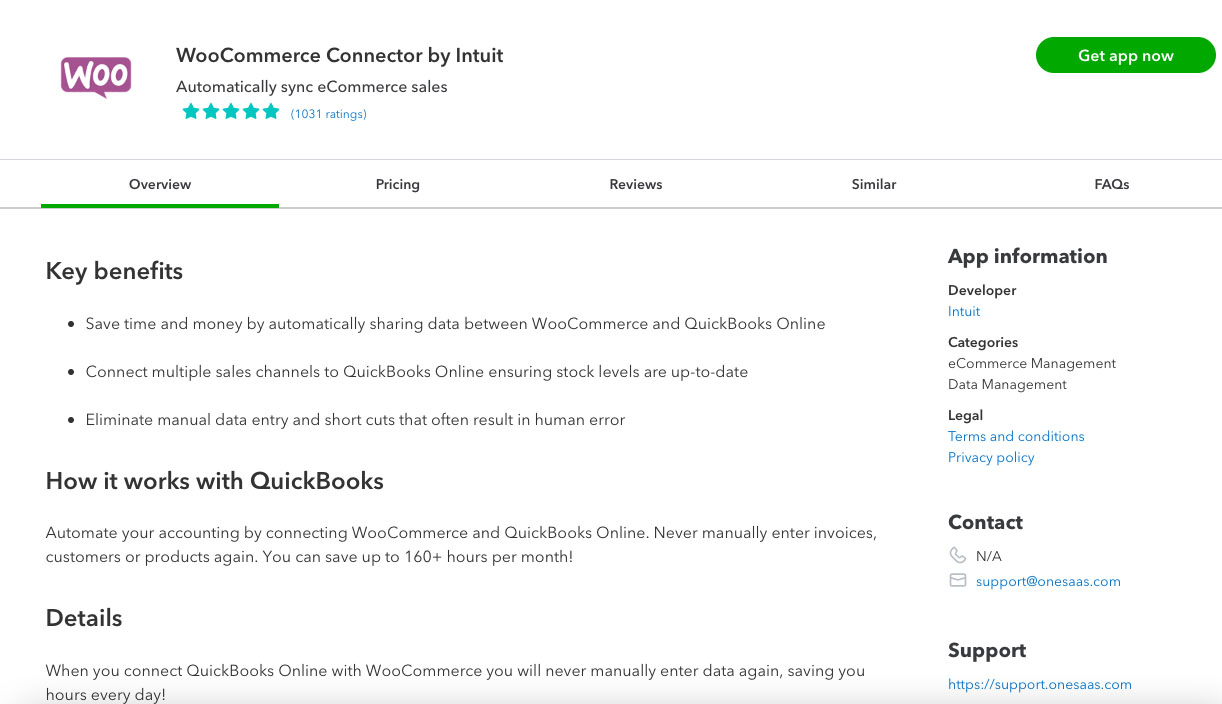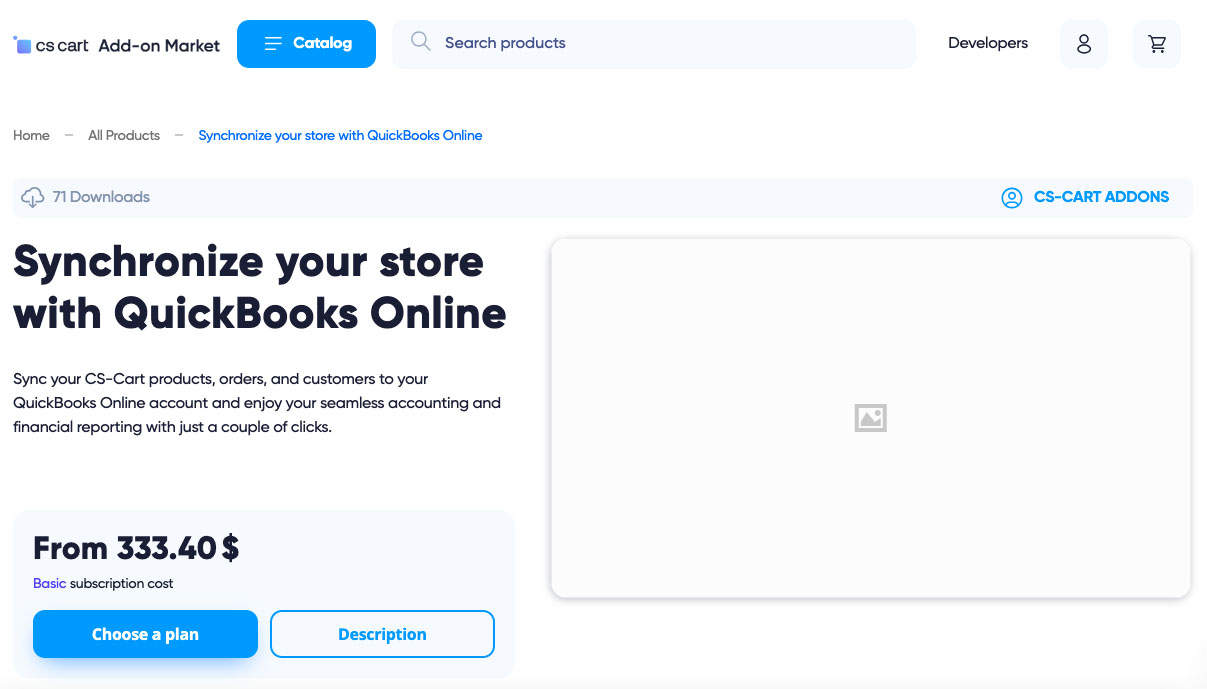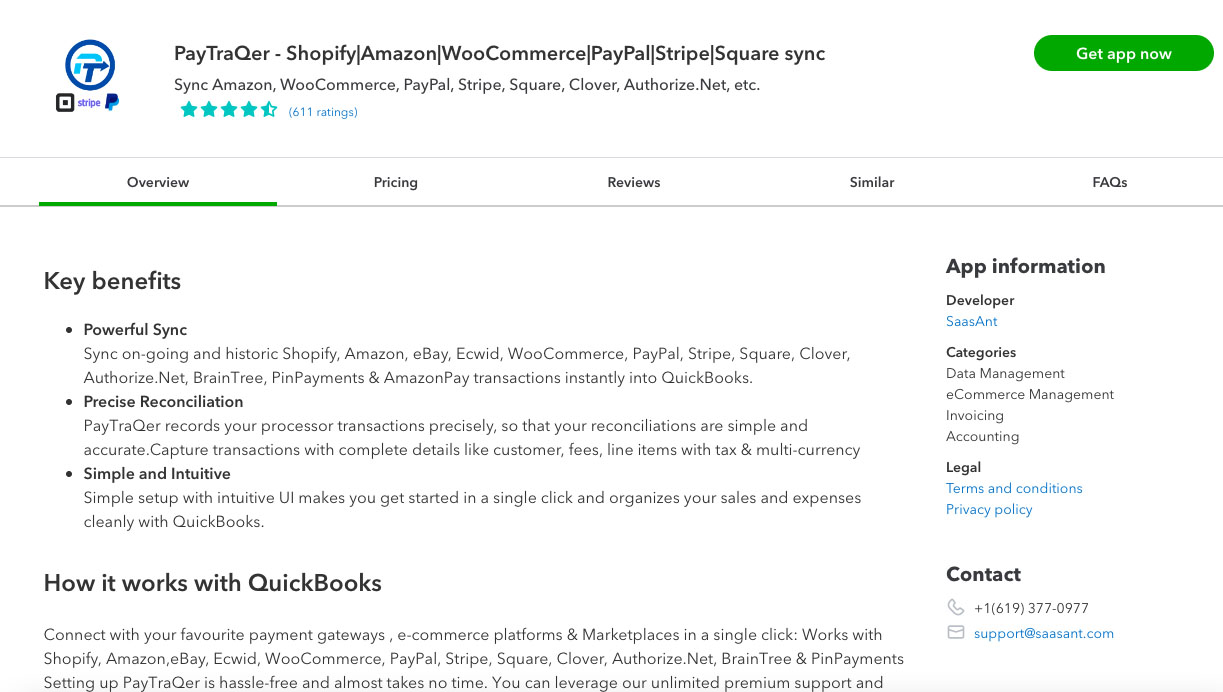The best ecommerce QuickBooks integration must support two-way data syncing between the platform and QuickBooks. It should allow you to synchronize crucial data, such as product details, sales orders, invoices, and payments. Also, we recommend choosing an integration that is built seamlessly into QuickBooks—meaning it can be set up directly from your QuickBooks Online account.
That said, here are our best ecommerce QuickBooks integration recommendations:
- QuickBooks Bridge by Parex: Best QuickBooks ecommerce integration for managing multiple sales channels
- Shopify Connector by QuickBooks: Best free QuickBooks ecommerce integration for managing Shopify stores
- WooCommerce Connector by Intuit: Best free QuickBooks ecommerce integration for managing WooCommerce stores
- CS-Cart Multi-Vendor: Best QuickBooks ecommerce integration for managing multivendor online marketplaces
- PayTraQer: Best QuickBooks ecommerce integration for payment processing
Don’t have QuickBooks Online yet? You may sign up for a 30-day free trial or purchase right away to get a 50% discount. Note that integrations may not work in the free trial version.
Best QuickBooks Online Ecommerce Integrations At a Glance
QuickBooks Bridge by Parex: Best Ecommerce Platform for QuickBooks for Managing Multiple Sales Channels

Pros
- Can handle sales from multiple channels
- Supports multiple stores
- Provides summary invoice sync for easy reconciliation
- Offers a pay-as-you-go plan
- Includes multicurrency support
- Option to sync automatically or manually
- Can sync backdated orders
Cons
- Requires additional fee to sync inventory products
- Doesn’t support QuickBooks Self-Employed
- Requires separate subscription for each store
Pricing
- Silver: $10 monthly for up to 100 orders; 5 cents per additional order of more than 100 orders
- Gold: $20 monthly for up to 800 orders; 2 cents per additional order of more than 800 orders
- Platinum: $30 monthly for up to 2,000 orders; 1 cent per additional order of more than 2,500 orders
If you don’t want to commit to a monthly plan, QuickBooks Bridge by Parex offers a pay-as-you-go option (20 cents per order). You may try the program for free for seven days but note that you need a paid subscription for the QuickBooks integration to work.
QuickBooks Bridge by Parex is our best ecommerce QuickBooks integration because it supports multiple sales channels. If you sell products on multiple platforms, such as Shopify, Wix, Amazon, Etsy, and Squarespace, QuickBooks Bridge by Parex gathers all your sales information from each channel and brings them over as combined data to QuickBooks Online.
What’s more, you can choose how your data is synchronized. You can set it to automatically sync at a specific time each day, or you can manually sync when needed. Additionally, if you have orders that were fulfilled before the integration is set up, you can sync backdated orders dating back to the last two months.
If you haven’t yet decided on an ecommerce platform, we recommend checking out our guide to the best ecommerce platforms for small businesses.
Shopify Connector by QuickBooks: Best Free QuickBooks Ecommerce Integration for Managing Shopify Stores

Pros
- Lets you connect multiple Shopify stores to QuickBooks Online
- Free with an active QuickBooks Online subscription
- Syncs orders, products, and inventory levels between QuickBooks and Shopify
- Includes global tax compliance features, like value-added tax (VAT) and goods and services tax (GST) support
- Can be set up directly from QuickBooks
Cons
- Complicated to learn
- Order edits can’t be synced once the order is transferred to QuickBooks Online
- No product mapping features
Pricing
Shopify Connector is free if you have an active QuickBooks Online account. You can set it up directly from within QuickBooks Online.
Shopify Connector by QuickBooks, which tops our list of the best Shopify integrations for QuickBooks, provides a free, direct connection between Shopify and QuickBooks Online. The integration syncs various critical data, including product information, orders and transactions, and payment information. Any updates made within Shopify are automatically mirrored in your QuickBooks Online account.
Furthermore, Shopify Connector by QuickBooks allows you to sync inventory between Shopify and your QuickBooks Online account. Whenever changes occur in your Shopify store, your stock levels in QuickBooks Online are automatically updated.
WooCommerce Connector by Intuit: Best Free QuickBooks Integration for Managing WooCommerce Stores
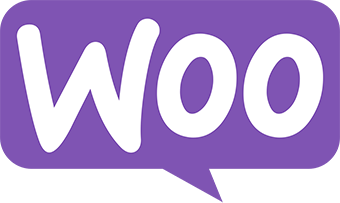
Pros
- Can push sales along with the payment data to QuickBooks
- Supports multiple currencies
- Can be set up directly from inside QuickBooks
- Supports multiple WooCommerce storefronts
- Supports an unlimited number of users
- Available for free
Cons
- Can’t sync stock levels
- Doesn’t track labor for picking and packing orders
- Can’t handle order fees coming from WooCommerce sales
Pricing
Just like the Shopify Connector by QuickBooks, the WooCommerce Connector by Intuit is free with an active QuickBooks Online subscription.
WooCommerce Connector by Intuit, as the name suggests, is a native plugin for connecting QuickBooks Online and WooCommerce. At its core, it acts as a bridge so that vital information—like customer orders, product details, inventory updates, sales transactions, and taxes—sync between the two products.
When a customer places an order on your WooCommerce store, WooCommerce Connector by Intuit automatically captures the transaction details. This includes customer information, product details, quantities, prices, taxes, and shipping costs. QuickBooks Online will then create a corresponding entry for each data sourced from WooCommerce.
CS-Cart Multi-Vendor: Best QuickBooks Ecommerce for Managing Multivendor Online Marketplaces

Pros
- Supports an unlimited number of sellers
- Can manage multiple stores
- Offers free premium technical support for three months
- Is available in a cloud (no-code) and on-premise version
- Lets you upload products in bulk
Cons
- Is expensive, especially the on-premise version
- Is difficult to set up integration
- Offers very limited features in both entry-level plans
- Lets users add an unlimited number of products and vendors only in the most expensive plan of the cloud-based version
Pricing
Cloud Version | On-premise Version |
|---|---|
You can try all subscriptions for free for 30 days. |
All plans support an unlimited number of vendors and products. Also, all tiers, save for Unlim, come with a 30-day free trial. |
CS-Cart Multi-Vendor has a unique purpose—it helps individuals and business owners build online marketplaces with multiple vendors. For instance, it can assist you in building a marketplace for independent vendors selling products in a similar niche. Each seller or vendor gets their own storefront with their own products.
When CS-Cart Multi-Vendor is integrated with QuickBooks Online, vendors can easily transfer various types of data, including product information, quantities, pricing, and customer details, to QuickBooks. Payments made by customers for products purchased from each vendor are also synchronized with QuickBooks Online.
The integration also transfers customer data, such as purchase history and contact information, from CS-Cart Multi-Vendor to QuickBooks Online. This can help vendors improve their marketing strategies and customer engagement.
PayTraQer: Best QuickBooks Ecommerce Integration for Payment Processing

Pros
- Lets you manage unlimited payment accounts
- Brings itemized payment information to QuickBooks
- Can manage fees, expenses, and refunds
- Supports an unlimited number of users
- Supports multicurrency transactions
- Multiple plans from which to choose
Cons
- Has limited features outside payment processing
- Lacks automated reconciliation feature
- Is unable to sync fields automatically
Pricing
- Launch: $9 monthly for up to 100 syncs a month
- Rise: $19 monthly for up to 500 syncs a month
- Scale: $29 monthly for up to 1,000 syncs a month
- Large: $49 monthly for up to 5,000 syncs a month
- Dynamic: $99 monthly for up to 10,000 syncs a month
You can try the platform for free for 15 days with no credit card required.
Once integrated with QuickBooks Online, PayTraQer syncs your PayPal, Stripe, and Square data to QuickBooks. This allows you to transfer essential data, including payments, invoices, refunds, and deposits, from your payment processor to QuickBooks with just a few clicks.
Instead of just summarizing payment totals, PayTraQer brings itemized data into QuickBooks, including customer specifics, product information, tax amounts, discounts, and shopping details for each transaction. This itemized payment information makes it easy to match transactions recorded in QuickBooks with those in bank statements or payment processor reports.
What’s more, PayTraQer offers other useful features to streamline payment processing, such as duplicate detection to prevent redundant entries, multicurrency support to manage internal transactions, and the ability to auto-apply existing invoices.
If you’re looking for a QuickBooks integration for other business ventures, see our roundup of the best QuickBooks Online integrations for small businesses.
How to Choose the Best QuickBooks Ecommerce Integration
When choosing the best ecommerce platform for QuickBooks Online integration, you must consider the following factors:
- Ease of setup: Setting up the integration should be easy so that you can use your desired features right away. This is why we recommend QuickBooks Online’s native integrations because you can directly set them up from inside QuickBooks with just a few clicks.
- Two-way data syncing capability: Ensure that data flows back and forth in real-time between the software and QuickBooks Online.
- Customization and flexibility: A good QuickBooks ecommerce integration allows you to customize how the data is mapped between the system and QuickBooks and must provide extended features, such as bulk data and historical data import.
- Multicurrency support: Many ecommerce businesses cater to international customers, so we believe that the best QuickBooks ecommerce integration must support multiple currencies.
- Task automation: Select an integration that automates repetitive tasks like order creation, invoicing, and payment tracking.
- Customer support: Reliable customer ensures prompt assistance in case you experience technical issues or have questions. The QuickBooks support team may be able to help, but it’s still important to verify that the integration provider also offers dedicated support for its software.
- Reviews and user feedback: Check out user reviews and seek recommendations from existing users and trusted sources to gauge how the integration works.
Frequently Asked Questions (FAQs)
Integrating your ecommerce platform with QuickBooks Online lets you transfer your sales data automatically to QuickBooks Online for accounting purposes. It also helps automate various tasks, such as invoicing, payment reconciliation, and inventory management.
Depending on your ecommerce software’s integration capability, you can import various types of data from QuickBooks to your ecommerce system, and vice versa. These include sales orders, product details, expenses, invoices, payments, taxes, vendor and customer information, and inventory levels.
Two-way data syncing means that data updates made in either QuickBooks or your eCommerce software are updated in both systems automatically.
It depends on the capability of your ecommerce platform. However, many QuickBooks Online ecommerce integrations, such as QuickBooks Bridge by Parex and Shopify Connector by QuickBooks, can be customized to adapt to your unique business needs and workflows.
Bottom Line
The best ecommerce QuickBooks Online integration depends on the ecommerce platform you use, such as Shopify, WooCommerce, and Wix, and the desired features you wish to automate. Additionally, you need to consider other factors, such as your business size and budget and the scalability and flexibility of the integration.


